Tchaikovsky: Pique Dame (Boder)
Introduction
'The Queen of Spades' is one of Tchaikovsky's most interesting works, yet has always sat just below its elder brother, Eugene Onegin, in the popularity stakes. This is a little unfair.
The plot is based on a short story by Pushkin, as many Russian operatic offerings have been. Here, it's been added to and altered somewhat by the composer's brother, Modest, and even Tchaikovsky himself, but the sense of angst, foreboding and general sense of doom in much of Russian literature remains.
The time is that of Catherine the Great, and much to Gilbert Deflo's credit, there has been no updating of the story to a more 'relatable' era.
Two Imperial officers are bemoaning lack of success in gambling, yet a third, Hermann, is almost completely obsessive in his habit, but yet hardly ever bets, and has precious little money anyway. Hermann is also completely besotted with a young woman, Lisa, who just happens to be engaged to Prince Yeletsky. When he discovers this, he becomes even more obsessed about winning the girl, and gaining himself a fortune. The fortune is more important.
Lisa's grandmother, a stereotypical Russian matriarch, is very wary of Hermann. She and Lisa have noticed him hanging around giving particularly brooding and disturbed looks. The grandmother, who used to be known as 'The Moscow Venus', is famous for being highly successful on the gambling tables herself, and years before, sold her favours freely for any hints as to how her fortune could be increased. She finally discovered the 'winning formula' of three cards from the Count St. Germain, and since then, only her husband and a young lover ever knew the secret. She had been warned about a third suitor.
Hermann knows most of this story, and is intent on learning the secret of the three cards himself. He plans to work on Lisa to get close to her grandmother. Luckily for him, Lisa isn't particularly happy in her engagement and is intrigued by the young officer's stare, and even more intrigued when he appears in her bedroom.
At a masked ball the following day, Hermann's two officer mates are discussing his increasing obsession about the three cards and make some loud comments about him being the 'third suitor' before disappearing back into the crowd. Hermann thinks he's hearing things.
Lisa hands him the key to her grandmother's room, saying she will not be there the following day, but Hermann goes that night instead and hides as the Countess approaches. As she begins to doze off he demands to know the secret of the three cards and threatens her with a pistol. She dies of shock. Lisa runs in, and finally realises that Hermann was only using her to win money.
Hermann returns to the barracks and receives a letter from Lisa asking him to meet her by the canal. He is imagining the choir singing at the Countess's funeral when her ghost appears. She tells him that she will let him know the secret of the three cards as long as he marries Lisa and looks after her. The cards are the three, the seven and the Ace.
Meeting up with Lisa as requested, he begins to rant about having found out the secret. Realising that he hardly even recognises her, she throws herself into the canal.
The final scene sees many men at a gambling house, playing cards, drinking, and generally having bloke-ish fun. Prince Yeletsky turns up for the first time. His engagement has been broken off (more permanently than he knows) and so he decides to see whether the old axiom 'unlucky in love, lucky at cards' is true. When Hermann turns up, ranting as usual, Yeletsky prepares for a possible fight, but Hermann only want to gamble. 40,000 Rubles is the bet on the first card, the three. Hermann wins, much to the annoyance of the assembled company. He then bets everything on the seven, which also turns up.
When Hermann grabs the wine and declares that everything is just a game, Yeletsky decides to bet against him in the next round. Hermann goes for the Ace, but Yeletsky has drawn the winning Queen of Spades. This was the nickname that the Countess was given years before, and realising he has been tricked and ruined, seeing the image in the drawn card laughing at him, shoots himself and asks for forgiveness before dying.
Sound & Vision
Generally very good. The orchestral sound is placed to the fore and sometimes gets in the way of the singing, especially when the chorus is on. The clarity of sound from the pit also makes us notice a few problems in ensemble, most notably at the start of the 'Pastoral' scene, and there's a very noticeable clarinet squeak in Yeletsky's first aria.
This is certainly Grand Opera done on a grand scale, and the William Orlandi's scenery (especially the highly-detailed painted backdrops) and costumes are as detailed and colourful as we can expect. These details and colours are picked up vividly in the NTSC transfer, and there's an impressive range of light and dark scenes appearing as naturally as you would need.
Extras
Here's where the whole package falls down. Apart from a 'Cast Gallery' and some basic information within the booklet, absolutely nothing in the way of extras.Conclusion
As I mentioned earlier, this is one of Tchaikovsky's most interesting scores, not necessarily for the originality it shows, but for the different styles of music he employs, from the 'heavy' Mozartian stylistic elements to the direct quoting of André Grétry, the late-Classical French composer, active during many of the years in which Catherine the Great was in power.Michael Boder directs the Liceu orchestra with great passion, and apart from the earlier slip-ups I mentioned before, they respond accordingly. So too do the chorus, who have a lot of work in this piece, and create dramatic, unified sound over some rather stiff movement. The final chorus is particularly beautiful.
The staging is lush and impressive, with some peculiar, yet not overly intrusive 'blackouts' for when characters such as Hermann have their more insular moments. There is one particular scene where this appears similar to a Stanley Kubrick monolith, yet may have looked more mysterious from the point of view of those in the auditorium.
'Monolithic' may also be a good term for much of the acting on stage, with the main culprit being Misha Dydyk (Hermann). His voice is heroic and his chiselled good looks would make many a young lady of whatever social status fall for him, however he travels through much of the opera with a stare that is at best, thoughtful, and at worst, like someone you would rather cross the street to avoid.
There is precious little believable interaction between Hermann and Lisa (a full-throated Emily Magee), however hard Lisa tries. Magee is one of the highlights on stage and her voice, although showing strain at times (maybe one of the nights on which it was filmed wasn't the most successful) is often quite
Wagnerian in tone. Her big aria in the 2nd scene is absolutely superb, but she also, look a little too pained throughout.possibly as she knew her suicide scene wan't going to be the most dramatic ever shown.
For me, Russian (like French) has always been a troublesome language in which to sing opera. It's certainly not one I fell for straight away, and was reminded why in the unaccompanied quintet in Act 1 when the 5 slightly different styles of vibrato didn't quite enable the harmony to come through (ok, it sounded pretty awful in places, but there you go).
Ewa Podleś, the great Polish soprano, is wonderful to watch as the Countess. She obviously had a great amount of fun playing the role, and her experience in holding the audience's attention while on stage shows by the bucketful. She has a huge range overall, and here the impressive lower parts of her voice are given a work out.
Ludovic Tézier (Yeletsky) has a very sweet, yet powerful tone, and his main aria in Act II (accompanied by the aforementioned clarinet squeak) is wonderful, but as with many others on stage, a little more variety in facial expression would be a great help.
Other, smaller roles are played out with some success, especially the grim and proper Governess, sung by Stefania Toczyska, and the Pastoral duo of Elena Zaremba and Michelle Marie Cook make a very welcome change to all the doom and gloom surrounding this interlude.
I think that main problem with this production is that the cast, on the whole, seem to have difficulty in creating solid 3-D characterisations that are needed to prevent the whole shebang falling into the quagmire of bad melodrama and stand-and-deliver singing which gives opera a bad name. Close you eyes however, and your experience is greatly enhanced…which is a bit of a drawback for a DVD.
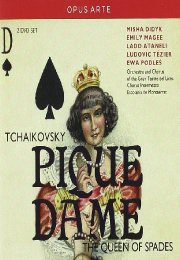
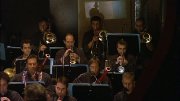
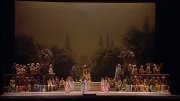
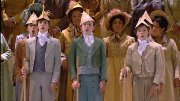
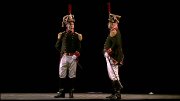

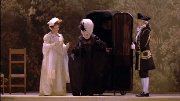
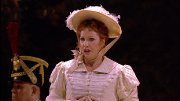

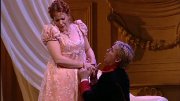
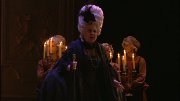
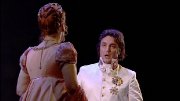
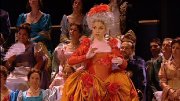

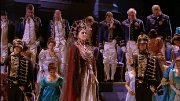

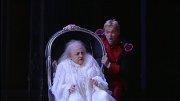
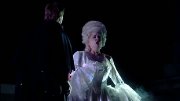
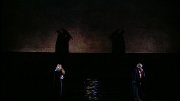
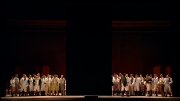
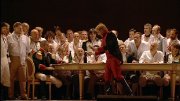











































Your Opinions and Comments
Be the first to post a comment!